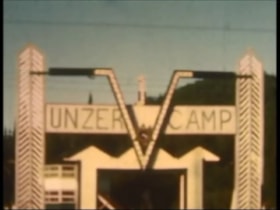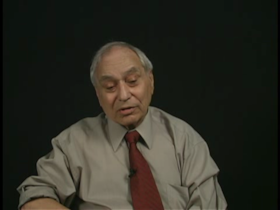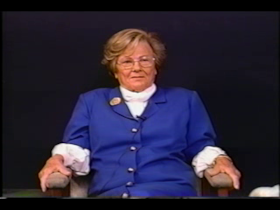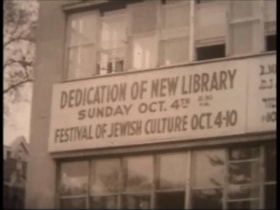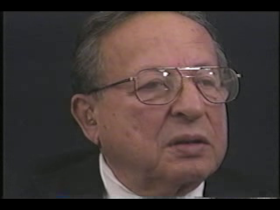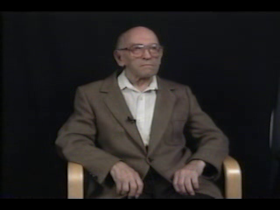More like 'cjhn283'
Narrow Results By
Place
- Amsterdam, Netherlands, Europe 1
- Beauport (Quebec) 1
- Bedzin, Poland, Europe 1
- Berlin, Germany, Europe 3
- Brussels, Belgium, Europe 1
- Budapest, Hungary, Europe 1
- Gera, Germany, Europe 1
- Iasi, Romania, Europe 1
- Karlsruhe, Germany, Europe 1
- Klimontów, Poland, Europe 1
- Lodz , Poland , Europe 1
- Ludwigshafen, Germany, Europe 1
Camp Kindervelt
https://www.cjhn.ca/link/cjhn78146
- Collection
- Camp Kindervelt/Camp Unzer Collection
- Description Level
- Fonds
- Material Type
- moving images
- Physical Description
- 1 film reel : col.
- Fonds No.
- 1357; 1357_001
- Date
- 1949-1954
- Collection
- Camp Kindervelt/Camp Unzer Collection
- Description Level
- Fonds
- Material Type
- moving images
- Physical Description
- 1 film reel : col.
- Date
- 1949-1954
- Fonds No.
- 1357
- Item No.
- 1357_001
- Storage Location
- 8-5A
- Notes
- Film capturing daily activities at Camp Kindervelt and Camp Unzer, between 1949-1954.
- Archival / Genealogical
- Archival Descriptions
- Repository
- Jewish Public Library Archives
Images
YouTube
Camp Kindervelt
https://www.youtube.com/embed/VeTryjsBiDUCieply, Isak - Oral History of a Holocaust Survivor
https://www.cjhn.ca/link/cjhn67767
- Collection
- WITNESS TO HISTORY COLLECTION (MHMC-02)
- Description Level
- Item
- Material Type
- moving images
- Physical Description
- 02:26:32
- Collection
- WITNESS TO HISTORY COLLECTION (MHMC-02)
- Description Level
- Item
- Material Type
- moving images
- Physical Description
- 02:26:32
- Language
- English
- Notes
- Isak Cieply was born on February 1, 1924 in Starachowice, Poland. He had five siblings and the family was very poor. In the fall of 1939, soon after the German invasion, the Jews of Starachowice were ordered to move into the ghetto. Isak was selected to work in a steel factory and his work pass protected him from round-ups. At the beginning of 1943 he was sent to the Bugaj camp to work in a supplies warehouse. In the summer of 1944 the camp was liquidated after rumours of the approach of the Soviet army had spread. The prisoners were taken to Auschwitz. Isak was sent to work in an electric supplies warehouse in Buna/Auschwitz III. There he met a German soldier who proposed a deal that Isak accepted. Isak was to supply this soldier with electric materials and, in return, he would get a loaf of bread every day. In January 1945 Isak was sent on a death march to the Flossenbürg concentration camp. Sometime later he was sent on another death march but succeeded to escape with some fellow prisoners. They eventually met American soldiers. After liberation Isak worked as the chief supplier of the Pfarrkirchen and Eggenfelden DP camps. He immigrated to Canada in 1948 and married the late Regina Cieply who was also a survivor. They had four children and several grandchildren, among them Jamie Benizri.
- Accession No.
- WTH-213
- Name Access
- Cieply, Isak
- Archival / Genealogical
- Archival Descriptions
- Repository
- Montreal Holocaust Museum
Images
YouTube
Cieply, Isak - Oral History of a Holocaust Survivor
https://www.youtube.com/embed/eIbnIGm8Rg8Dawang, Elie - Oral History of a Holocaust Survivor
https://www.cjhn.ca/link/cjhn60321
- Collection
- WITNESS TO HISTORY COLLECTION (MHMC-02)
- Description Level
- Item
- Material Type
- moving images
- Physical Description
- 03:55:00
- Collection
- WITNESS TO HISTORY COLLECTION (MHMC-02)
- Description Level
- Item
- Material Type
- moving images
- Physical Description
- 03:55:00
- Language
- French
- Notes
- Elie Dawang was born on January 4, 1934 in Paris, France, to Lithuanian parents. Elie has good memories of his early childhood, being raised by loving and well-off parents. In May 1940, the Dawangs left Paris for a small village near the Spanish border. Despite the great danger, they went back to Paris to liquidate the business of Feivish, Elie’s father. The three of them were arrested in September 1941 and while Feivish managed to get Elie out of prison, he couldn’t do anything to save himself or his wife. They were both sentenced and sent to jail for possessing false papers. They both ended up in Auschwitz, but Elie’s mother was gassed upon arrival whereas Feivish survived the war. Meanwhile, Elie was being taken care of by a Jewish woman. Elie and his caretaker almost got arrested during the roundup of Vel d’Hiv but managed to hide. After a few months hiding in the suburbs of Paris, they moved to the country where they stayed until liberation. When Paris was liberated, they moved back there and Elie returned to school. He reunited with his father in May 1945. They moved to Canada in 1951 with Elie’s stepmother. Elie describes the process to immigrate, his first impressions of Montreal and Canada and his involvement in Holocaust education.
- Accession No.
- WTH-482
- Name Access
- Dawang, Elie
- Places
- Paris, France, Europe
- Archival / Genealogical
- Archival Descriptions
- Repository
- Montreal Holocaust Museum
Images
YouTube
Dawang, Elie - Oral History of a Holocaust Survivor
https://www.youtube.com/embed/f95UEOppbHEFamily Gathering to Commemorate the Passing of Leo Roback
https://www.cjhn.ca/link/cjhn31759
- Collection
- Lea Roback Fonds
- Description Level
- File
- Material Type
- sound recording
- Physical Description
- 1 audiocassette
- Fonds No.
- 1243; 2; 00314
- Date
- 1985
- Collection
- Lea Roback Fonds
- Description Level
- File
- Material Type
- sound recording
- Physical Description
- 1 audiocassette
- Date
- 1985
- Fonds No.
- 1243
- Series No.
- 2
- File No.
- 00314
- Storage Location
- 2-4F
- Container 12
- Language
- English
- Acquisition Source
- Lea Roback
- Access Restrictions
- Privacy restrictions may apply
- Reproduction Restrictions
- Copyright restrictions may apply
- Finding Aid
- Audio content summary available
- Name Access
- Roback, Lea, 1903-2000
- Subjects
- Roback, Leo
- Roback, David
- Labour movement
- Labour unions
- Social justice
- World War, 1939-1945 - Personal narratives
- Archival / Genealogical
- Archival Descriptions
- Repository
- Jewish Public Library Archives
Documents
YouTube
Family Gathering to Commemorate the Passing of Leo Roback
https://www.youtube.com/embed/nsQkNxe8IlYFeist, Ursula - Oral History of a Holocaust Survivor
https://www.cjhn.ca/link/cjhn60304
- Collection
- WITNESS TO HISTORY COLLECTION (MHMC-02)
- Description Level
- Item
- Material Type
- moving images
- Physical Description
- 01:41:00
- Collection
- WITNESS TO HISTORY COLLECTION (MHMC-02)
- Description Level
- Item
- Material Type
- moving images
- Physical Description
- 01:41:00
- Language
- English
- Notes
- Ursula Feist (née Erber) was born on June 2, 1921 in Berlin, Germany. Before Hitler, Ursula, her parents and sister, Brigitta, lived in a comfortable economic status. Ursula had a good educational background. Her father was very observant and Ursula discusses how she might have turned out more observant in her life today, had she not been forced by her father to go to synagogue. With the rise of Nazism, Ursula describes living in perpetual fear from 1933 until 1939. Beginning in 1934, the family experienced financial hardship and Ursula went to a commercial college to learn how to type and take short hand. She found employment at an Italian agency from March until November 1938 -- Kristallnacht. Ursula describes Kristallnacht as the most horrible thing: she remembers coming down in the morning and seeing windows smashed and synagogues burning. By the beginning of 1939, many Jews were leaving Germany. Ursula obtained tickets to Shanghai from the Italian agency for her parents and sister. For herself, she made arrangements to go to England to stay with a longtime pen pal. On May 19, 1939, two weeks before her eighteenth birthday she got onto a children's transport to England. Her parents left for Shanghai in June 1939. She remembers the SS coming on the train and emptying out suitcases to find anything of value. In England, Ursula stayed with the Wicker family near Chester in North England. The family treated Ursula like one of their own. She had to adjust to a life where she did not have to worry. Ursula went to Birmingham and trained as a nurse. In May 1940, she was interned at a woman’s camp on the Isle of Man for one year. The British government had no way of knowing who was a Nazi sympathizer so they interned everybody. While in the camp, she met a woman from Munich who was the aunt of her future husband, David. Ursula worked as a waitress in the Cumberland Hotel and David came and asked her if he could take her to the theatre. Later she got a monitoring service job at the BBC. She listened to Hitler's speeches and had to translate and transcribe them. She and David married in 1943. David wanted to join the Commandos when he learnt that his mother was killed but instead he got into the intelligence corps and then the pioneer corps. Their first son, Anthony, was born in London in 1948. By this time, communication with Ursula’s parents had stopped. They had been living under Japanese control in Shanghai and under terrible circumstances. After the war they immigrated to Minneapolis, United States. Her father had angina and died. Later, her mother and sister moved to New York. Life in post-war England was difficult due to very high taxes. In 1951, Ursula and David came to Canada in search of employment. They did not go to the United States because they were afraid that their son would be drafted. Their second son, Daniel was born in Montreal in 1954. Ursula worked in the Neurological Hospital and then the Royal Victoria Hospital as an administrative assistant to the chief of surgery. Her children are both married and she has two grandchildren from each son. Ursula talks about the fact that she is still homesick for London; they visit very often and have very close friends there. She has also been back to Berlin several times.
- Accession No.
- WTH-267
- Name Access
- Feist, Ursula
- Places
- Berlin, Germany, Europe
- Archival / Genealogical
- Archival Descriptions
- Repository
- Montreal Holocaust Museum
Images
YouTube
Feist, Ursula - Oral History of a Holocaust Survivor
https://www.youtube.com/embed/oAO-Kk5yy_8Film, Dedication of the Jewish Public Library at 4499 avenue d'Esplanade
https://www.cjhn.ca/link/cjhn78143
- Collection
- Jewish Public Library Historical Collection
- Description Level
- Item
- Material Type
- moving images
- Physical Description
- 1 film : b&w
- Fonds No.
- 1000A; 1; 00001; 1000_00001
- Date
- October 4, 1953
- Collection
- Jewish Public Library Historical Collection
- Description Level
- Item
- Material Type
- moving images
- Physical Description
- 1 film : b&w
- Date
- October 4, 1953
- Fonds No.
- 1000A
- Series No.
- 1
- File No.
- 00001
- Item No.
- 1000_00001
- Storage Location
- Bay 1
- Creator
- Chanukas Habais Film
- Related Material
- Jewish Public Library Fonds
- Archival / Genealogical
- Archival Descriptions
- Repository
- Jewish Public Library Archives
Images
YouTube
Film, Dedication of the Jewish Public Library at 4499 avenue d'Esplanade
https://www.youtube.com/embed/1MLc3CVpShwFrost, Jacob - Oral History of a Holocaust Survivor
https://www.cjhn.ca/link/cjhn67760
- Collection
- WITNESS TO HISTORY COLLECTION (MHMC-02)
- Description Level
- Item
- Material Type
- moving images
- Physical Description
- 01:40:49
- Collection
- WITNESS TO HISTORY COLLECTION (MHMC-02)
- Description Level
- Item
- Material Type
- moving images
- Physical Description
- 01:40:49
- Language
- English
- Notes
- Jacob Frost was born on November 15, 1909 in Gera, Germany. He worked in a carpet factory after finishing Volksschule (primary education) and graduating from a non-Jewish high school. As soon as the Nuremberg laws were passed, he and his family were well aware of the dangers of the Nazis. By 1934, they had begun the process of trying to emigrate. Jacob witnessed Kristallnacht and was rounded up and taken to Buchenwald. He calls the experience at Buchenwald a “concentration” camp rather than an “internment” camp. He witnessed many brutalities, including a well-respected man of the community “losing his marbles” and a doctor tending this man’s self-inflicted wounds. Jacob spent five weeks at Buchenwald and could return to Gera as long as he had proof of papers to emigrate. With the advice and help of several kind gentiles along the way, Jacob made the voyage to Israel. He traveled by boat via Vienna to Salina, Romania, arriving in Israel in 1940. He immigrated to Canada in 1950.
- Accession No.
- WTH-075
- Name Access
- Frost, Jacob
- Places
- Gera, Germany, Europe
- Archival / Genealogical
- Archival Descriptions
- Repository
- Montreal Holocaust Museum
Images
YouTube
Frost, Jacob - Oral History of a Holocaust Survivor
https://www.youtube.com/embed/I_Tyt93j1KcGoldberg, Peter - Oral History of a Holocaust Survivor
https://www.cjhn.ca/link/cjhn60297
- Collection
- WITNESS TO HISTORY COLLECTION (MHMC-02)
- Description Level
- Item
- Material Type
- moving images
- Physical Description
- 00:59:33
- Collection
- WITNESS TO HISTORY COLLECTION (MHMC-02)
- Description Level
- Item
- Material Type
- moving images
- Physical Description
- 00:59:33
- Language
- English
- Notes
- Peter Goldberg was born on May 12, 1919 in Paberze, a village approximately 20 km from Vilnius, Lithuania (Vilna, Poland), where he and his nine siblings were raised in an orthodox Jewish home. The Russian Army occupied Vilnius in 1939 until the Germans took over in 1941. Peter recalls the many restrictions placed on Jews, including the wearing of yellow stars, forced labour, and the establishment of the Jewish ghetto. Peter and his wife had to stay in the ghetto for about seven months. They remained there, often in hiding, until it was liquidated by the German Gestapo. Then, for ten months, they paid to live in a Polish house approximately 10 km from the Ghetto. Peter was taken to do forced labour as a coal digger in Bielawaka ? concentration camp. Once the camp was liquidated, he and his wife had to return to the ghetto in Vilnius for a second time until it closed in 1943. They spent about eight months in the Vilnius HKP-562 concentration camp where Peter was forced to work as a mechanic. The Germans liquidated the camp in July 1944. After liberation by the Russian Army, he and his wife returned home. He knew that most of his family had been killed immediately upon arrival in the ghetto in Vilnius (Vilna). After the war, Peter worked as a baker and a stock keeper of food for the Russian Army. When the borders opened in 1957, Peter, his wife and their daughter immigrated to Poland. They lived there until December 1958 when they decided to immigrate to Canada, as Peter’s sister was living in Montreal. Once here, Peter worked as a butcher and manager of a meat store.
- Accession No.
- WTH-050
- Name Access
- Goldberg, Peter
- Archival / Genealogical
- Archival Descriptions
- Repository
- Montreal Holocaust Museum
Images
YouTube
Goldberg, Peter - Oral History of a Holocaust Survivor
https://www.youtube.com/embed/kd0CWEt_QrcGuter, Ernest - Oral History of a Holocaust Survivor
https://www.cjhn.ca/link/cjhn67763
- Collection
- WITNESS TO HISTORY COLLECTION (MHMC-02)
- Description Level
- Item
- Material Type
- moving images
- Physical Description
- 01:09:12
- Collection
- WITNESS TO HISTORY COLLECTION (MHMC-02)
- Description Level
- Item
- Material Type
- moving images
- Physical Description
- 01:09:12
- Language
- English
- Notes
- Ernest Guter was born on April 7, 1917 in Toru?, Poland (Thorn, Germany). A year after his birth, his parents moved to Berlin then back to their hometown, Stolp. At a young age, Ernest joined the Maccabees and travelled across Germany preparing for the Jewish Youth Aliyah. In January 1938, he went to Berlin and became a social worker apprentice. One year later, he was transferred to the German Jewish Congress as a social worker. Ernest was in Berlin during Kristallnacht. A man helped him hide with other Jewish men in a store for several days, until it was calmer. Ernest stayed hidden in Berlin until he managed to get a visa to the United Kingdom. On the day that the German army entered Czechoslovakia, Ernest left for Great Britain. While working for the Rothschild’s, Ernest attended night-school at the College of Southampton, attempting to obtain a social science diploma. In 1940, all males with German passports living in England were interned. Ernest was originally interned in London, and then spent eight weeks interned on the Isle of Man. He was offered the choice of either staying on the Isle of Man for the duration of the war or going to either Canada or Australia. He chose Canada by chance and was sent to the Sherbrooke internment camp. Hymie Grover, a knitting-mill operator got Ernest out of the internment camp. He attended McGill University and graduated in 1945. He married a Jewish Canadian woman and has three children.
- Accession No.
- WTH-132
- Name Access
- Guter, Ernest
- Archival / Genealogical
- Archival Descriptions
- Repository
- Montreal Holocaust Museum
Images
YouTube
Guter, Ernest - Oral History of a Holocaust Survivor
https://www.youtube.com/embed/Ponlj5fYRdIHeller, Anita - Oral History of a Holocaust Survivor
https://www.cjhn.ca/link/cjhn67769
- Collection
- WITNESS TO HISTORY COLLECTION (MHMC-02)
- Description Level
- Item
- Material Type
- moving images
- Physical Description
- 01:36:39
- Collection
- WITNESS TO HISTORY COLLECTION (MHMC-02)
- Description Level
- Item
- Material Type
- moving images
- Physical Description
- 01:36:39
- Language
- English
- Notes
- Anita was born on April 26, 1926 in Karlsruhe, Germany. She came from a relatively well-off family. Her father, a German businessman, served as an officer in the German Army during WWI. He attended the 1912 Olympic Games as a member of the German Soccer Team. Her mother came from Warsaw. When she was two, the family moved to Berlin to live in a villa with servants. Anita attended a small private girl school from 1932 to 1937. She wasn't really aware of her Jewish roots before 1933. But her life changed the very day Hitler came to power. As anti-Jewish laws tightened, Anita felt a little bit more excluded every day. In 1935, her brother was sent to Scotland where he attended Kurt Hahn's school. In the summer of 1937, her parents took the decision to move to Engelberg, a small town near Luzern, Switzerland. The family left Berlin, leaving everything behind them. Anita was sent to a convent school in Luzern. Although they were able to get an American visa, the family decided to move to France in 1938. Being of Alsatian descent, they were eligible for French citizenship, which drove them to settle down in Paris where they led an undisturbed life until the war broke out. Her father was interned in a camp because he came to be viewed as an enemy alien. Eventually, in May 1940 the whole family succeeded in obtaining a Canadian visa and left Paris for Montreal. Anita didn't really enjoy her first years in Montreal as she experienced strong antisemitism on one side and on the other side was rejected by fellow Jews because of her German Citizenship. In 1947, she graduated from McGill University. She got married one year later and had two children.
- Accession No.
- WTH-291
- Name Access
- Heller, Anita
- Places
- Karlsruhe, Germany, Europe
- Archival / Genealogical
- Archival Descriptions
- Repository
- Montreal Holocaust Museum
Images
YouTube
Heller, Anita - Oral History of a Holocaust Survivor
https://www.youtube.com/embed/g46CQOiRFjYInterviews with Lea Roback
https://www.cjhn.ca/link/cjhn31752
- Collection
- Lea Roback Fonds
- Description Level
- File
- Material Type
- sound recording
- Physical Description
- 1 audiocassette
- Fonds No.
- 1243; 1; 00307
- Date
- 1982
- Collection
- Lea Roback Fonds
- Description Level
- File
- Material Type
- sound recording
- Physical Description
- 1 audiocassette
- Date
- 1982
- Fonds No.
- 1243
- Series No.
- 1
- File No.
- 00307
- Storage Location
- 2-4F
- Container 12
- Creator
- Radio-Canada
- Language
- English
- French
- Acquisition Source
- Les Roback
- Access Restrictions
- Privacy restrictions may apply
- Reproduction Restrictions
- Copyright restrictions may apply
- Finding Aid
- Audio content summary available
- Name Access
- Roback, Lea, 1903-2000
- Places
- Montreal (Quebec)
- Archival / Genealogical
- Archival Descriptions
- Repository
- Jewish Public Library Archives
Documents
YouTube
Interviews with Lea Roback
https://www.youtube.com/embed/geoc2xAPs5QInterview with Lea Roback
https://www.cjhn.ca/link/cjhn31751
- Collection
- Lea Roback Fonds
- Description Level
- File
- Material Type
- sound recording
- Physical Description
- 1 audiocassette
- Fonds No.
- 1243; 1; 00306
- Date
- 1996
- Collection
- Lea Roback Fonds
- Description Level
- File
- Material Type
- sound recording
- Physical Description
- 1 audiocassette
- Date
- 1996
- Fonds No.
- 1243
- Series No.
- 1
- File No.
- 00306
- Storage Location
- 2-3B
- Container 12
- Creator
- Harris, E.
- Language
- English
- Acquisition Source
- Lea Roback
- Access Restrictions
- Privacy restrictions may apply
- Reproduction Restrictions
- Copyright restrictions may apply
- Finding Aid
- Audio content summary available
- Subjects
- Antisemitism
- Emigration and immigration.
- Nazi Germany
- International Ladies' Garment Workers' Union
- Communist Party of Canada
- Communism
- Textile industry -- Canada.
- Labour unions
- Young Men's-Young Women's Hebrew Association
- Pesotta, Rose
- Shane, Bernard
- Rose, Fred
- Archival / Genealogical
- Archival Descriptions
- Repository
- Jewish Public Library Archives
Documents
YouTube
Interview with Lea Roback
https://www.youtube.com/embed/KMWRppX703YInterview with Sophie Bissonnette
https://www.cjhn.ca/link/cjhn31754
- Collection
- Lea Roback Fonds
- Description Level
- File
- Material Type
- sound recording
- Fonds No.
- 1243; 1; 00309
- Date
- 1991
- Collection
- Lea Roback Fonds
- Description Level
- File
- Material Type
- sound recording
- Date
- 1991
- Fonds No.
- 1243
- Series No.
- 1
- File No.
- 00309
- Storage Location
- 2-4F
- Container 12
- Creator
- Radio Centreville
- Language
- French
- Acquisition Source
- Lea Roback
- Notes
- About film "Des lumieres dans la Grande Noirceur"
- Access Restrictions
- Privacy restrictions may apply
- Reproduction Restrictions
- Copyright restrictions may apply
- Finding Aid
- Audio content summary available
- Name Access
- Radio Centreville
- Roback, Lea, 1903-2000
- Subjects
- Montreal (Quebec) -- Jews
- Women
- Women's Studies
- Antisemitism
- Folk music
- Music.
- Communism
- Quebec (Province)
- Places
- Montreal (Quebec)
- Archival / Genealogical
- Archival Descriptions
- Repository
- Jewish Public Library Archives
Documents
YouTube
Interview with Sophie Bissonnette
https://www.youtube.com/embed/lpwDIXwp70IKlag, Leo - Oral History of a Holocaust Survivor
https://www.cjhn.ca/link/cjhn67777
- Collection
- WITNESS TO HISTORY COLLECTION (MHMC-02)
- Description Level
- Item
- Material Type
- moving images
- Physical Description
- 02:19:42
- Collection
- WITNESS TO HISTORY COLLECTION (MHMC-02)
- Description Level
- Item
- Material Type
- moving images
- Physical Description
- 02:19:42
- Language
- English
- Notes
- Leo Klag was born on August 16, 1920 in Berlin, Germany. He grew up in an assimilated family. As a teenager in Berlin, he witnessed the rise of antisemitism in Germany since 1933. He saw the boycott of Jewish stores on April 1, 1933, book burnings and demonstrations on the streets of Berlin. He attended the Olympic Games in 1936. During Kristallnacht, his father and brother were taken away and disappeared forever. Leo fled to Hamburg believing the situation was better there. As it was not the case, he went back to Berlin and hid in a Jewish sports complex until February 1939. At this point, he was so sick that he went to hospital where he met a man who helped him organize his immigration to England. Upon his arrival in England, he was interned in the Kitchener camp where he worked for the War Office in a wireless station, listening to communications between German submarines and their bases. After the capitulation of France, Leo was sent to the Isle of Man with other German refugees. He was then shipped to Canada in July 1940. He was interned in Fort Lennox, on the Ile-aux-Noix. After two years he was free to move to Montreal where he worked in the press business. After the war he moved to the USA for two years then went to Israel for one year. He has been back to Germany several times since the end of the war.
- Accession No.
- WTH-516
- Name Access
- Klag, Leo
- Places
- Berlin, Germany, Europe
- Archival / Genealogical
- Archival Descriptions
- Repository
- Montreal Holocaust Museum
Images
YouTube
Klag, Leo - Oral History of a Holocaust Survivor
https://www.youtube.com/embed/kqSb-K6Yj4MKotkowsky, Charles - Oral History of a Holocaust Survivor
https://www.cjhn.ca/link/cjhn67759
- Collection
- WITNESS TO HISTORY COLLECTION (MHMC-02)
- Description Level
- Item
- Material Type
- moving images
- Physical Description
- 01:09:37
- Collection
- WITNESS TO HISTORY COLLECTION (MHMC-02)
- Description Level
- Item
- Material Type
- moving images
- Physical Description
- 01:09:37
- Language
- English
- Notes
- Charles Kotkowsky was born in Piotrkow Trybunalski, Poland on August 8, 1920. He says that he encountered significant antisemitism growing up. After the German invasion in September 1939, he was made to wear an armband identifying him as Jewish and became afraid to go outside. A ghetto was constructed almost immediately in Piotrkow Trybunalski. Charles worked in a glass factory and was in communication with a Jewish Resistance group. In 1942, he and his brother Shlomo were taken to a nearby labour camp. In November 1944, they were again transferred, first to the HASAG Pelzery, near Cz?stochowa, Poland, and then to Buchenwald in January 1945, where Charles was tormented and humiliated by being forced to strip naked in the freezing cold. Charles was taken on a death march to Floeszberg - a subdivision of Buchenwald - in Febuary 1945. The camp was incomplete, and Charles had to help in its construction. In April the camp was evacuated and the prisoners were placed on a train headed for Czechoslovakia. Along with seven other people, including his brother, Charles jumped off the train and successfully escaped. The group was hidden by sympathetic Czechoslovaks in Plzen, Czech Republic (Czechoslovakia). They were there hiding in a barn when they were liberated by the American Army on May 8, 1945. After the war, Charles mentioned that he was invited to what he described as a “séance,” where he witnessed captured S.S. men being beaten - one of whom was killed. His brother contracted tuberculosis and needed to be moved to a hospital in another town. Unfortunately, Charles could not stay with him in Czechoslovakia for long. He soon moved to a series of DP camps in Italy, working in a doctor’s office. In 1951, he was refused entry into the United States, but was accepted into Canada, arriving there that same year.
- Accession No.
- WTH-068
- Name Access
- Kotkowsky, Charles
- Archival / Genealogical
- Archival Descriptions
- Repository
- Montreal Holocaust Museum
Images
YouTube
Kotkowsky, Charles - Oral History of a Holocaust Survivor
https://www.youtube.com/embed/8hmNmz1HpGoKutscher, Jean - Oral History of a Holocaust Survivor
https://www.cjhn.ca/link/cjhn67764
- Collection
- WITNESS TO HISTORY COLLECTION (MHMC-02)
- Description Level
- Item
- Material Type
- moving images
- Physical Description
- 01:31:06
- Collection
- WITNESS TO HISTORY COLLECTION (MHMC-02)
- Description Level
- Item
- Material Type
- moving images
- Physical Description
- 01:31:06
- Language
- French
- Notes
- Jean Kutscher was born on January 24th, 1926 in Paris to Romanian parents. His parents had fled Romania because of antisemitism. Jean and his siblings attended a laic school and grew up in a secular home. In France, Jean and his relatives didn’t experience antisemitism before 1939. However, they knew what was going on in Germany, thanks to the news shown before movies in theatres. As a French citizen (not as a Jew), Jean was shocked by Germany invading France. At that point, several anti-Jewish laws were enacted. Jean and his siblings started to understand what it was to be Jewish. Although it was compulsory, Jean and his older brother decided not to wear the yellow star. Later on, Jews were frequently rounded up from the street. First, Jean’s father was sent to Drancy in 1941, and then his brother was arrested on the street and sent to Drancy. They were both taken to Germany to a destination unknown to their relatives. Jean’s girlfriend, who was a Gentile, helped the family and provided them with food. On September 23rd, 1942, French policemen arrested Jean, one of his brothers, his sister and his mother. At the police station, adults and children were separated. Jean lied about his age, enabling him to stay with his younger brother and sister. It was the last time they saw their mother. Jean’s sister was housed by the family of a friend while Jean and his brother left Paris. They planned to go to Lyon where one of their aunts lived. They managed to cross the line of demarcation by themselves, without a guide. Unfortunately, they couldn’t stay in their aunt’s apartment, and therefore joined the “Compagnons de France.” Jean couldn’t stand it so he returned to Paris without his brother. Jean worked as a salesman in a Parisian department store. One day, policemen came to the store and told the young men working there that they had to come back the next day with some personal belongings. They were to be sent to Germany to work in exchange for the liberation of French POW’s. This mandatory service was called “Le Service du Travail Obligatoire” (STO). The police specified that if the men did not obey, the store directors and their families would be sent to Germany. Jean was taken to Germany and worked on a barge for one year. He was treated well and people trusted him. When Jean first saw the Allies in March 1945, he was hiding in a bunker near Duisburg. He was liberated by Canadians and served as an interpreter between Canadians and Germans for one month. Upon his arrival in Paris in 1945, Jean discovered the existence of concentration and death camps. As a result, Jean enrolled in the army to go to Germany but his superiors refused to send him there. Instead, Jean was sent to Morocco in April of 1945, and later to Indochina. He returned to Paris in 1947. He married his girlfriend in 1949. Jean and his wife immigrated to Montreal where they discovered a Jewish life like they had never seen before. Since his mother’s arrest, Jean has never stopped feeling traumatized and guilty.
- Accession No.
- WTH-149
- Name Access
- Kutscher, Jean
- Places
- Paris, France, Europe
- Archival / Genealogical
- Archival Descriptions
- Repository
- Montreal Holocaust Museum
Images
YouTube
Kutscher, Jean - Oral History of a Holocaust Survivor
https://www.youtube.com/embed/DBPicl1NsVA"L'Art d'Aujourd'hui"
https://www.cjhn.ca/link/cjhn31756
- Collection
- Lea Roback Fonds
- Description Level
- File
- Material Type
- sound recording
- Physical Description
- 1 audiocassette
- Fonds No.
- 1243; 2; 00311
- Date
- 1978
- Scope and Content
- Interview with author Michael Dufresne, host Gilles Aineaux (?), art critic.
- Collection
- Lea Roback Fonds
- Description Level
- File
- Material Type
- sound recording
- Physical Description
- 1 audiocassette
- Scope and Content
- Interview with author Michael Dufresne, host Gilles Aineaux (?), art critic.
- Date
- 1978
- Fonds No.
- 1243
- Series No.
- 2
- File No.
- 00311
- Storage Location
- 2-4F
- Container 12
- Creator
- Radio-Canada
- Language
- French
- Acquisition Source
- Lea Roback
- Access Restrictions
- Privacy restrictions may apply
- Reproduction Restrictions
- Copyright restrictions may apply
- Finding Aid
- Audio content summary available
- Name Access
- Roback, Lea, 1903-2000
- Subjects
- Art
- Archival / Genealogical
- Archival Descriptions
- Repository
- Jewish Public Library Archives
Documents
YouTube
Lea Roback Recollections
https://www.cjhn.ca/link/cjhn31753
- Collection
- Lea Roback Fonds
- Description Level
- File
- Material Type
- sound recording
- Physical Description
- 1 audiocassette
- Fonds No.
- 1243; 1; 00308
- Date
- 1982
- Collection
- Lea Roback Fonds
- Description Level
- File
- Material Type
- sound recording
- Physical Description
- 1 audiocassette
- Date
- 1982
- Fonds No.
- 1243
- Series No.
- 1
- File No.
- 00308
- Storage Location
- 2-4F
- Container 12
- Language
- English
- French
- Acquisition Source
- Lea Roback
- Access Restrictions
- Privacy restrictions may apply
- Reproduction Restrictions
- Copyright restrictions may apply
- Finding Aid
- Audio content summary available
- Name Access
- Roback, Lea, 1903-2000
- Subjects
- Antisemitism
- Nazi
- Nazi Germany
- Places
- Poland
- Beauport (Quebec)
- Archival / Genealogical
- Archival Descriptions
- Repository
- Jewish Public Library Archives
Documents
YouTube
Lea Roback Recollections
https://www.youtube.com/embed/OffI19TCA1AMeisels, Ron - Oral History of a Holocaust Survivor
https://www.cjhn.ca/link/cjhn67766
- Collection
- WITNESS TO HISTORY COLLECTION (MHMC-02)
- Description Level
- Item
- Material Type
- moving images
- Physical Description
- 01:53:20
- Collection
- WITNESS TO HISTORY COLLECTION (MHMC-02)
- Description Level
- Item
- Material Type
- moving images
- Physical Description
- 01:53:20
- Language
- English
- Notes
- Ron was born on June 7, 1935 in Budapest, Hungary, an only child. While his father's religious background was very orthodox, his mother's family was less religious. This led to tensions in the marriage, and they divorced in 1938. Ron's mother began a relationship with another man, Mor Makover, who later became Ron's stepfather. Ron still went to synagogue and had Sabbath dinners with his father's family every Friday night. He attended a neighbourhood Jewish elementary school, where he learnt to speak Hungarian and Hebrew. Ron remembers the day when German troops invaded Hungary and the fear that entered into his family's life from then on. Soon they were forced to wear the yellow Star of David. As Ron's father was a Polish citizen, his mother had become Polish too, and was now forced apply for residence documents. On May 1, 1944, she was arrested while waiting at the Polish embassy. She was taken into an old rabbinical college, where many Jews were held before being deported to Auschwitz and Dachau. After about two months, Raoul Wallenberg arrived at the college and, setting up a chair and table, proceeded to hand out Swedish passports to the captives. Ron's mother asked for additional passports for Ron and his father. Having been made Swedish citizens, they were now permitted to leave, and Ron's mother came home again. Soon after, in August 1944, Ron and his mother were moved into a designated "Swedish house," which was only for Swedish citizens. By this time Ron's stepfather, Mor, had been taken to a forced labour camp. Ron's mother took great risks to bring him food several times a week, passing as a Hungarian gentile by not wearing the yellow star. One time, when she went to bring him food as usual, she found out that he had been put on a train for deportation. Rushing to the train station, she found Wallenberg standing on the platform in front of the train. At her request, Wallenberg told the officials that there was a Swedish citizen on the train, and Ron's father's name was called out. Mor recognized it, and was able to pass as his mother's ex-husband. He was taken off the train and reunited with Ron and his mother. Only four inmates were to survive that particular deportation. By December 1944, all Jewish residents, irrespective of their Swedish nationalities, were ordered to line up in front of their houses and were sent to the ghetto. Ron thinks that by this time Wallenberg had lost some of his influence and was not able to stop the ghettoization of the Swedish citizens. By sneaking away from the line, Mor managed to save Ron's mother's wedding ring, which he was later able to trade in for a sack off flour. During their stay in the ghetto, there was heavy bombing of the houses and their own building was hit, completely destroying their living quarters on the top floor. A falling cross beam injured Ron and his mother. After having been treated at the hospital they were forced to move into the basement, which was extremely filthy and unhygienic. In January 1945, the Russian troops arrived and the ghetto was liberated. Mor found a cart, and took Ron and his mother back to their old apartment. A Christian woman had moved in, and Mor had to threaten that he would denounce her as a Nazi sympathizer before she finally moved out voluntarily. Mor and Ron's mother finally married in August 1945. After some years in Hungary under Communism, the family decided to leave in 1954. In order to save a man who had been selling arms to Israel from Hungary, as a cover-up, the Israeli government issued passports to Polish Jews in Hungary. Ron's family was among the lucky ones and was able to leave to Vienna and then Lim, Austria. There they waited for papers to enter the United States or Canada. Ron remembers being extensively questioned by the CIA on their lives in Communist Hungary. Finally their papers for Canada arrived and the family emigrated in November 1954.
- Accession No.
- WTH-183
- Name Access
- Meisels, Ron
- Places
- Budapest, Hungary, Europe
- Archival / Genealogical
- Archival Descriptions
- Repository
- Montreal Holocaust Museum
Images
YouTube
Meisels, Ron - Oral History of a Holocaust Survivor
https://www.youtube.com/embed/EudnIwlrhoIPenney, Lea - Oral History of a Holocaust Survivor
https://www.cjhn.ca/link/cjhn67761
- Collection
- WITNESS TO HISTORY COLLECTION (MHMC-02)
- Description Level
- Item
- Material Type
- moving images
- Physical Description
- 01:29:10
- Collection
- WITNESS TO HISTORY COLLECTION (MHMC-02)
- Description Level
- Item
- Material Type
- moving images
- Physical Description
- 01:29:10
- Language
- English
- Notes
- Lea Penney (née Prilutzky) was born on February 17, 1922 in Berlin, Germany. Her parents were of Ukrainian origin and had immigrated to Germany during the pogroms in Russia. Her father worked for a large insurance company. Lea describes her father as "ultra-orthodox," and accordingly family life was very observant. They did not live in a particularly Jewish part of Berlin and Lea began by going to a German public school. It was only later that she joined a Jewish school. The day Adolf Hitler was appointed Chancellor, Lea remembers the tremendous fear and excitement that entered into the lives of her family and the Jewish community. In her own family, the situation was never discussed because her father wanted to shelter his children as much as possible. About every six months, new antisemitic restrictions were enforced. Because of these laws, her father eventually lost his job as an insurance salesman laws and began to deliver coal instead. The family had to move to a smaller and cheaper apartment. It was then that Lea felt the poverty and hunger which began to dominate family life. Rumours about concentration camps began to circulate within the community. Lea was part of a Jewish group that was training youths to go to Palestine and work on a Kibbutz. On November 9, 1938, the day of Kristallnacht, she was taking part in a preparatory camp near Hamburg, when everyone was told by the monitors to be quiet and turn off the lights. The next day the youths found out what had happened in the rest of Germany. As she discovered later, the Jewish Association had paid the Nazis to protect the children. In February 1939, at 17 years old, Lea was brought to Palestine by the organization. There she lived on Kibbutz for two years until 1941. Even though work was very hard, she felt a great sense of relief at the freedom she had there. In the beginning, she was still able to write and receive letters to her family in Germany. Later on all communication ceased. She describes that there was a great amount of pressure for young people in Palestine to join the British army. After having worked cleaning and ironing for some time, she decided to do so, and eventually became an English, German, and typing teacher in the army. She was stationed in Egypt and during the last years of the war was contacted by the Red Cross to send financial assistance to her mother, who had been found in Paris. As she later found out, her father had made it to Paris too, after hiding for some time in Germany. From a Paris labour camp, however, he was eventually deported to Auschwitz, where he perished. All her siblings had been able to leave Germany, some to England, others to Palestine. Lea met her husband in the army and they married in Cairo in 1946. The couple moved to England where they stayed until 1953. Her husband was a civil servant, and received a job offer in Geneva, where they lived from 1953 to 1965. After staying a year in Germany, they eventually moved to Montreal in 1969, where they have lived ever since. Lea and her husband have two sons and one daughter.
- Accession No.
- WTH-081
- Name Access
- Penney, Lea
- Places
- Berlin, Germany, Europe
- Archival / Genealogical
- Archival Descriptions
- Repository
- Montreal Holocaust Museum
Images
YouTube
Penney, Lea - Oral History of a Holocaust Survivor
https://www.youtube.com/embed/f7PVB7qCr50